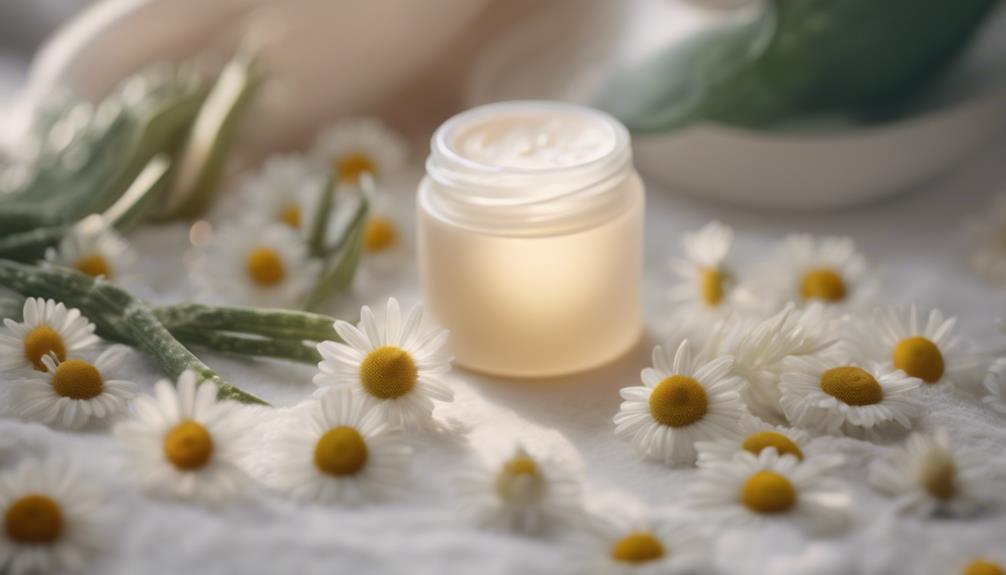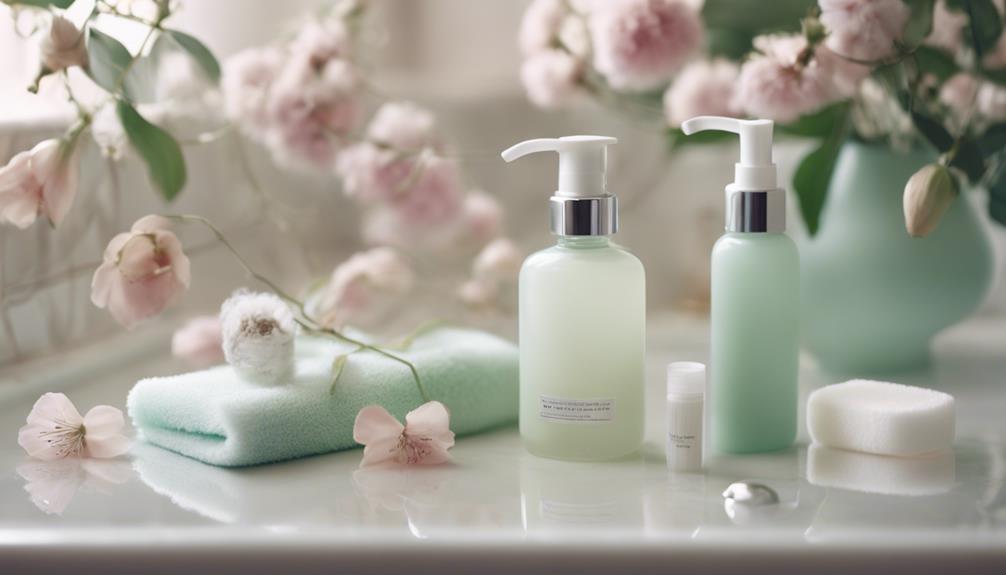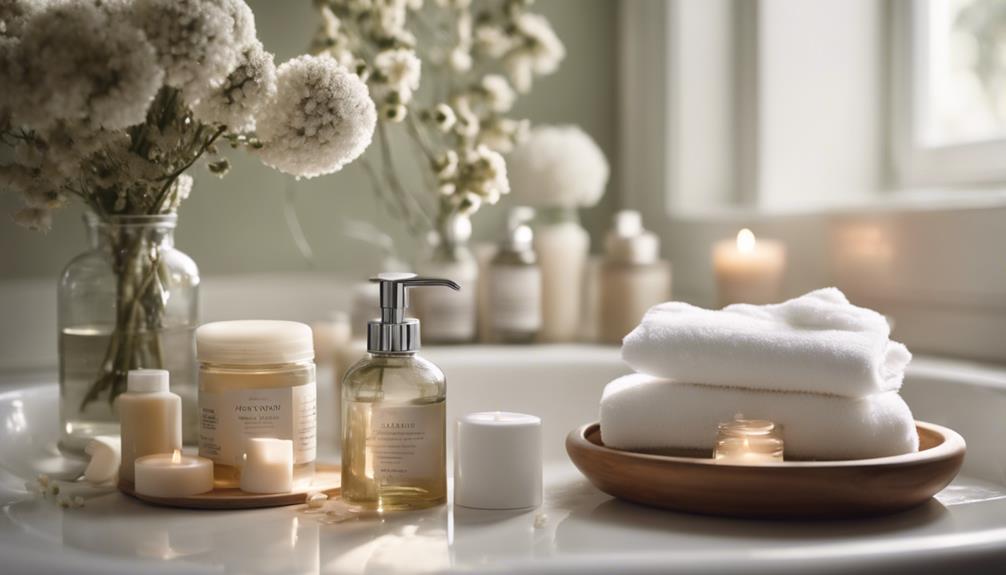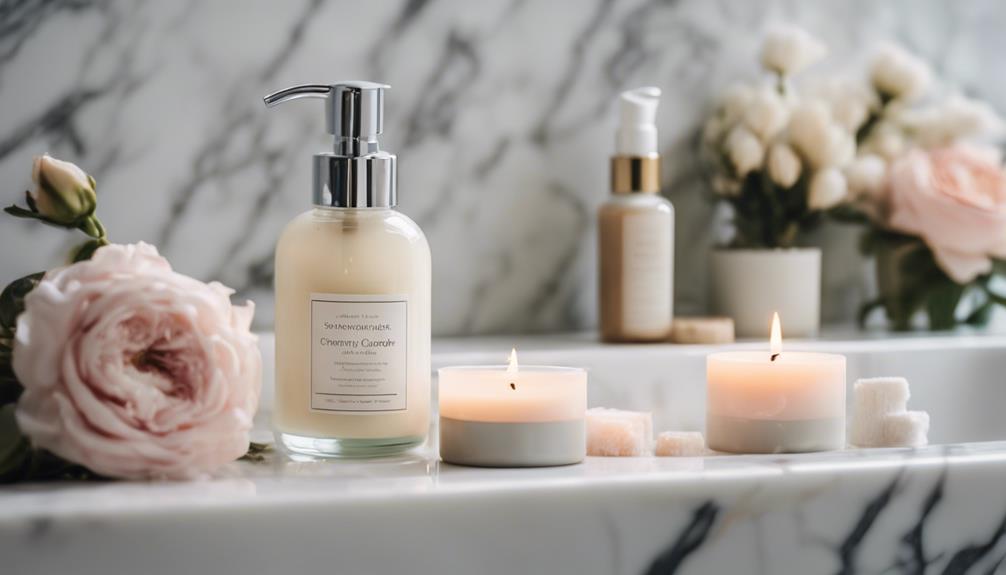Caring for sensitive skin requires a gentle approach. Begin by using a mild, fragrance-free cleanser to prevent any irritation. Next, apply an alcohol-free toner to help maintain your skin’s pH balance. Use a moisturizer with fatty acids to keep your skin hydrated without clogging pores. Limit exfoliation to once or twice a week with gentle products. Be cautious of ingredients and opt for calming extracts like aloe vera and chamomile. Pay attention to how your skin reacts to different products to identify triggers. By following these steps, you can establish a reliable skincare routine that protects and nourishes your sensitive skin. And there is more to learn on this journey!
Key Takeaways
- Choose fragrance-free, hypoallergenic products to minimize irritation and support sensitive skin health.
- Start with a gentle cleanser that maintains the skin barrier without stripping moisture.
- Incorporate soothing ingredients like aloe vera and chamomile to calm sensitive areas.
- Limit exfoliation to 1-2 times a week with non-abrasive products to avoid irritation.
Understanding Sensitive Skin
Sensitive skin reacts strongly to various stimuli, making it essential for you to understand its unique characteristics and triggers. This type of skin is often marked by a weakened skin barrier, which leads to increased reactivity and symptoms like redness, dryness, and irritation. When your skin reacts, you might feel burning, itching, or stinging sensations, especially in thinner areas like the face.
To maintain skin health, it's vital to adopt a gentle skincare routine. Products specifically formulated for sensitive skin can help minimize discomfort and prevent flare-ups. Look for calming ingredients that soothe irritation and strengthen your skin barrier. Avoid harsh chemicals and fragrances, as these can easily irritate sensitive skin and exacerbate existing conditions.
Taking the time to identify personal triggers will empower you to create a tailored approach to your skincare. By understanding how your skin reacts to different factors, you can choose products and routines that enhance comfort and well-being. Prioritizing gentle care won't only protect your skin but also promote its overall health and resilience.
Identifying Skin Triggers

Identifying your skin triggers is essential for managing sensitivity effectively.
You'll want to pay attention to common irritants, like synthetic fragrances and alcohol, that can cause reactions.
Keeping a reaction diary can help you track personal responses and better understand what to avoid in your skincare routine.
Common Skin Irritants
Many everyday products contain common skin irritants that can trigger unwanted reactions, so it's essential to know what to look for. By understanding these irritants, you can safeguard your sensitive skin.
| Common Skin Irritants | Effects on Sensitive Skin | Tips for Avoidance |
|---|---|---|
| Synthetic Fragrances | Can cause redness and itching | Check product labels |
| Harsh Chemicals | Compromise skin barrier | Opt for gentle formulations |
| Alcohol | Dries out skin, increases sensitivity | Look for alcohol-free options |
| Sulfates | Strips natural oils, irritates skin | Choose sulfate-free products |
| Parabens | Potential allergens | Avoid products with parabens |
| Allergens | Trigger allergic reactions | Maintain a reaction diary |
When shopping, always read product labels carefully to spot these irritants. Regular patch testing new products on a small area of skin can also help you identify potential triggers before a full application. By being proactive about avoiding these common skin irritants, you can help maintain a calm and healthy complexion.
Tracking Personal Reactions
Tracking your personal reactions can be a game-changer in managing skin sensitivities and avoiding future flare-ups. By keeping a reaction diary, you can identify specific triggers that lead to irritation in your sensitive skin.
Start recording the products you use, noting any harsh ingredients like alcohol or synthetic fragrances, which often exacerbate sensitivity. Pay attention to the timing and severity of your reactions after trying new products. This practice can help you pinpoint potential allergens or irritants.
Don't forget to take into account environmental factors, such as changes in temperature or humidity, that could influence your skin's reactions. Regularly review your diary to spot patterns, which will empower you to make informed skincare choices tailored to your unique sensitivities.
Whether it's avoiding certain ingredients or adjusting your routine based on weather conditions, this proactive approach helps you navigate the world of skincare more effectively. Remember, knowledge is your best ally in minimizing irritation and maintaining healthy skin.
Choosing Gentle Products

When selecting products for sensitive skin, prioritize those that are fragrance-free and hypoallergenic to reduce irritation risks. Gentle products can make a significant difference in maintaining your skin's health.
Here's what to look for:
- Fragrance-Free: Choose products without added fragrances, as these can cause irritation.
- Hypoallergenic: Opt for hypoallergenic formulations designed to minimize allergic reactions.
- Soothing Plant-Based Ingredients: Look for soothing ingredients like aloe vera and chamomile, known for their calming effects.
- Non-Irritating Formulations: Select products specifically labeled for sensitive skin, guaranteeing they've appropriate pH levels and gentle components.
Avoid harsh chemicals, sulfates, and alcohols, as these can disrupt your skin barrier and worsen sensitivity.
Always conduct a patch test before introducing new products to your routine. This simple step will help you identify any adverse reactions and guarantee your skincare remains a soothing experience.
Building a Simple Routine

Starting with a gentle cleanser sets the foundation for a simple, effective skincare routine tailored to your sensitive skin. Choose a mild, hydrating formula, like a gel or cream, that preserves your skin barrier without stripping moisture.
After cleansing, apply a soothing toner that's fragrance-free and alcohol-free to help rebalance your skin's pH. Look for ingredients like aloe vera or chamomile to promote calmness and hydration.
Next, use a moisturizer rich in fatty acids and humectants. This will help maintain your hydration levels and protect your skin barrier. It's best to apply it right after cleansing and toning for ideal absorption.
Limit exfoliation to just 1-2 times per week, using gentle, non-abrasive products to avoid irritating your delicate skin. Over-exfoliation can disrupt your skin barrier, leading to sensitivity.
Daily Skincare Steps

Begin your daily skincare routine with a mild cleanser to gently remove impurities while keeping your skin's natural oils intact. Choose a gel or cream formula and cleanse no more than once daily to maintain hydration.
After cleansing, follow these steps to guarantee your sensitive skin gets the care it needs:
- Apply a Toner: Use a soothing, alcohol-free toner to rebalance your skin's pH and add an extra layer of hydration. This step is vital for sensitive skin.
- Moisturize: Apply a gentle moisturizer enriched with calming ingredients like aloe vera or chamomile. This locks in moisture and strengthens your skin barrier, which is key for maintaining healthy skin.
- Protect with Sunscreen: Apply a broad-spectrum sunscreen daily. Opt for physical blockers like zinc oxide or titanium dioxide to shield your sensitive skin from harmful UV rays without causing irritation.
- Evening Care: In the evening, repeat the cleansing routine and follow with a reparative cream or hydrating serum containing hyaluronic acid to promote overnight hydration and recovery.
Techniques for Application

Applying your skincare products with care is essential for sensitive skin, guaranteeing they absorb effectively without causing irritation. Start by performing patch tests on a small area before you introduce any new products. This helps you detect potential adverse reactions early.
When you're ready to apply products, use gentle, upward strokes with your fingertips. This technique minimizes irritation and promotes absorption into your skin.
For toners or serums, opt for soft, clean cotton pads to apply them—harsh materials can aggravate your sensitive skin. Avoid rubbing or scrubbing; instead, focus on patting or pressing the products into your skin to maintain the integrity of your skin barrier.
When it comes to moisturizing, pay special attention to dry areas. Apply a generous amount of fragrance-free moisturizer and allow it to absorb fully before layering additional products.
Remember to pat your skin dry with a soft towel after cleansing, rather than rubbing, to further protect your delicate skin. By following these techniques for application, you'll guarantee that your skincare routine provides the gentle care your sensitive skin needs.
Customizing Your Routine

To customize your skincare routine, start by identifying your skin triggers and what irritates you.
Once you know these factors, you can tailor your product selection to include gentle ingredients that calm rather than aggravate your sensitive skin.
This personalized approach makes a significant difference in how your skin feels and looks.
Identify Skin Triggers
Identifying your skin triggers is essential for customizing a skincare routine that effectively manages sensitivity and avoids irritation. To do this, you'll want to be mindful of the products you use and pay attention to any reactions your skin has. Here's a simple guide to help you identify skin triggers:
- Keep a Reaction Diary: Track your skin's responses to specific products, ingredients, and environmental factors. This will help you recognize patterns of irritation and discomfort.
- Read Ingredient Labels: Common potential irritants include fragrances, alcohol, harsh chemicals, and certain preservatives. Choose fragrance-free options whenever possible.
- Consider Environmental Factors: Be aware that extreme temperatures, humidity, and pollution can exacerbate sensitivity. Adjust your skincare routine based on these conditions.
- Patch Test New Products: Always test new products on a small area of skin before applying them fully. This can help you identify potential irritants and avoid unwanted reactions.
Tailor Product Selection
Selecting the right products for your sensitive skin is essential to creating a routine that soothes rather than irritates. Start by prioritizing hypoallergenic and fragrance-free options to reduce the risk of irritation and allergic reactions.
Gentle care is key, so look for formulations rich in natural oils and plant-based ingredients like aloe vera and chamomile, which are known for their soothing properties.
Before introducing any new product, always conduct a patch test on a small area of your skin. This helps you identify any potential adverse reactions before applying it to your entire face.
Non-comedogenic and lightweight moisturizers are also vital, as they maintain hydration without clogging pores or overwhelming your delicate skin.
Importance of Lifestyle Factors

Lifestyle factors play an essential role in maintaining the health and resilience of sensitive skin. By making mindful choices, you can enhance your skin barrier and minimize irritation. Here are four key lifestyle factors to take into account:
1. Balanced Diet: Incorporate omega-3 fatty acids, antioxidants, and vitamins into your meals. Foods like salmon, walnuts, and leafy greens can reduce inflammation and promote overall skin health.
2. Stay Hydrated: Drink plenty of water throughout the day. Staying adequately hydrated helps flush out toxins and keeps your skin moist, which is vital for sensitive skin's barrier function.
3. Quality Sleep: Aim for 7-9 hours of quality sleep each night. This not only allows for skin repair but also helps maintain a calm appearance, reducing the risk of flare-ups.
4. Stress Management: Practice techniques like yoga or meditation. Lowering your cortisol levels can minimize stress-related skin issues and enhance your skin's resilience.
Professional Guidance Options

Seeking professional guidance can greatly enhance your skincare routine by providing tailored solutions for your sensitive skin concerns. Consulting a dermatologist gives you access to personalized recommendations that address your unique skin sensitivities.
During a professional skin assessment, the dermatologist can help identify specific triggers that may cause irritation, allowing you to choose products that minimize adverse reactions.
Patch testing is often suggested for new products, ensuring they won't provoke an unwanted response. This precaution is especially important when you're managing sensitive skin. Regular check-ups with your dermatologist can monitor your skin health and adjust your skincare regimen based on any changes or reactions you may experience.
Moreover, professional guidance can extend beyond topical treatments. Dermatologists may recommend dietary and lifestyle modifications that support overall skin health, further enhancing your sensitive skin routine.
Embracing Natural Ingredients

Embracing natural ingredients can transform your skincare routine by harnessing the soothing and nourishing properties that sensitive skin craves. By incorporating these gentle ingredients, you're not just addressing your skin needs; you're also promoting a healthier skin barrier.
Here are four natural ingredients to contemplate:
- Aloe Vera: Known for its hydrating and anti-inflammatory qualities, it calms irritation while providing moisture.
- Cucumber: Its invigorating properties help soothe sensitive skin and reduce puffiness, making it a perfect addition to your routine.
- Rose Extracts: With anti-inflammatory benefits, rose extracts reduce redness and irritation, while their calming aroma enhances your skincare experience.
- Turmeric: This powerful ingredient offers antibacterial and skin-brightening effects, promoting a more even skin tone while calming inflammation.
Using products formulated with these natural ingredients not only nurtures your skin but also minimizes the risk of irritants often found in synthetic alternatives.
Prioritizing gentle care for delicate skin guarantees you maintain a strong skin barrier, protecting your sensitive skin from environmental aggressors.
Embrace these natural solutions for a soothing, effective skincare routine!
Can the Skincare Routine for Sensitive Skin be Adapted to Include Natural and Organic Products?
Adapting a skincare routine for sensitive skin to include natural and organic products can be beneficial. Natural skincare routine organic care products are generally gentle and free from harsh chemicals, reducing the risk of irritation. Look for calming ingredients like aloe vera and chamomile to soothe sensitive skin without causing further irritation.
Conclusion
In your journey to nurture sensitive skin, remember that gentle care is your best friend.
By understanding your triggers and choosing the right products, you'll create a soothing routine that feels like a warm embrace.
Don't forget to customize your approach and consider lifestyle factors, as they play a crucial role in your skin's health.
With patience and dedication, your delicate skin can thrive, radiating beauty and confidence that shines like a beacon.









